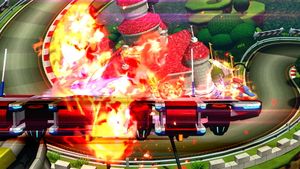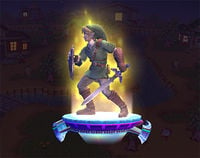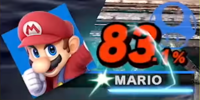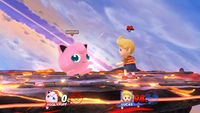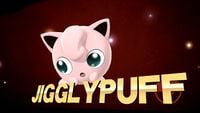Final Smash
| “ | The basic gist of it? I suppose you could say it's kind of like a powerful and personalized hammer. (Or maybe not...) | ” |
| —Masahiro Sakurai, Smash Bros. DOJO!! | ||
A Final Smash (最後の切りふだ, Last Trump Card) is a type of last resort attack introduced in Super Smash Bros. Brawl, and Smash's equivalent to a super move in other fighting games.
Overview[edit]
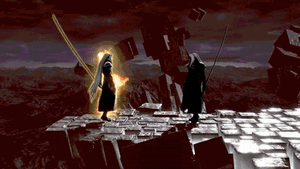
Final Smashes tend to be incredibly powerful attacks, often leaving the user invincible for the move's duration (the periods vary from character to character, but always apply upon startup/execution), and are generally unblockable. If properly executed, they usually have the capacity to KO at least one opponent. Final Smashes performed correctly will give the player a great advantage, and may help to catch up to others or cement a commanding lead. Many Final Smashes also temporarily slow down stage elements, such as platform movements and motions in the background. However, in many cases, stage hazards' hitboxes remain active while a non-cutscene Final Smash is in effect, making them exploitable for gaining additional damage.[1]
To perform a Final Smash, a player must first either destroy a Smash Ball or fall sufficiently far behind in a match that they are given a "Pity Final Smash" upon respawning. In Ultimate, a player can also fill the Final Smash Meter (although then the Final Smash will be weaker) or be given a Final Smash by Victini. Once any of these happen, the screen will darken, the player's character will be engulfed in a multi-colored aura and their eyes will glow a bright yellow (red for Meta Knight in Ultimate); officially referred to as Standby Mode, the character's neutral special move is effectively replaced with a single use of their Final Smash.
In Brawl, the majority of Final Smashes are powerful enough that they have the potential to KO incredibly early or even one-hit KO if used properly. In Super Smash Bros. 4, Final Smashes were universally made much weaker, many of them no longer being able to KO opponents at low percentages. In Super Smash Bros. Ultimate, they have been slightly nerfed overall once again. If a player doesn't use a Final Smash granted by the Final Smash Meter in about 20 seconds, the effect will expire. Final Smashes have also been tweaked to be less disruptive to the gameplay.
Bayonetta's Infernal Climax in SSB4 became the first Final Smash with the potential to instantly KO trapped opponents. In Ultimate, several Final Smashes have this property.
Most Final Smashes cause the camera to temporarily zoom in on the user when activated, though there are some situations where this does not occur, such as with Pac-Man's Final Smash, Super Pac-Man. In Super Smash Bros. for Wii U, through a currently unconfirmed nature, there are some cases where Final Smashes that normally zoom in don't zoom in at all. In Ultimate, there are two types of zooms: activating after breaking the Smash Ball will have a special closeup angle on the user, and activating from a Final Smash Meter, an area that would cause the angled camera to clip through platforms, or 2D stages will have a standard zoom similar to Brawl and SSB4.
While multiple players can be in standby mode simultaneously, only one Smash Ball or Final Smash can be present onscreen at any given time. When a Final Smash is active, all other players on standby temporarily exit standby mode and regain it upon conclusion, although they will keep the yellow eyes. When most Final Smashes are performed in the air, upon ending the move, the character gains a slight boost in height and regains their spent midair jumps, usually preventing a self-destruct.
Final Smashes are affected by Rage and stale-move negation (and therefore will usually gain a freshness bonus), along with spirits in Ultimate, but are not affected by stat changes from equipment or Mii Fighter sizes in Smash 4.
Prior to Brawl[edit]
Masahiro Sakurai revealed in an interview with former Nintendo president Satoru Iwata that he intended to include Final Smashes in the original Super Smash Bros., even going as far as to record voice clips for each of them.[2] However, the Nintendo 64's console limitations could've been the reason why they were scrapped and the idea wouldn't be implemented until Brawl. Some of these voice clips, which were contained in the Super Smash Bros. debug menu, were eventually and correspondingly used in Brawl.
Pity Final Smash[edit]
A Pity Final Smash (Easy Final Smash in SSB4 and Ultimate) randomly occurs when any player is KO'd and is 5 points behind the current leader. Also, in SSB4, at least 6 KOs between all players must be landed for any player to acquire one. This player respawns with the ability to perform a Final Smash. This Final Smash cannot be dropped by the player.
In a 2-player timed match in Brawl, since the points differ by two for each kill, it is possible to go from a lead of 4 points to 6 without triggering the Pity Final Smash condition (which is to be exactly 5 points behind). If a player SD's, and consequently loses only one point, then a Pity Final Smash is possible.
Pity/Easy Final Smashes cannot occur while a Smash Ball is present on the battlefield, even when the requirements are met. In Brawl, Pity Final Smashes can be disabled only by turning the Smash Ball off; simply setting the overall item frequency to "None" does not prevent players from getting them. In SSB4, either method will prevent Easy Final Smashes. Additionally, they cannot occur in 2 player matches, for AI players, or by a player SD'ing.
Changes in Ultimate[edit]
Sakurai stated in a Nintendo Direct that every Final Smash would be standardized to be simple and straight to the point. As a result, Final Smashes were made universally faster in Ultimate, removing most player-controlled ones; the KO potential of Final Smashes has also been reduced. Because of the universal speed increase and control removal applied to Final Smashes, many Final Smashes such as Bowser's Giga Bowser, Wario's Wario-Man, and Little Mac's Giga Mac had their functionality changed significantly (they no longer use their full moveset transformation Final Smash; it is instead a single attack that quickly returns to regular gameplay). Others such as Fox and Falco's Landmaster and Donkey Kong's Konga Beat, have been completely replaced. The Final Smash Meter (FS Meter) is also introduced, which is a toggle feature in the rules that allows players to gain a weaker form of their Final Smash by filling up their gauge during battle. However, while multiple meters can be full at once, only one Final Smash can be performed at a time. All other FS Meters are disabled while a Final Smash is active, then re-enabled once it concludes. As of update version 4.0.0, players can hold onto a full FS Meter for up to 20 seconds before losing it and starting over. In addition, when Victini appears, it will give the fighter who summoned it access to their Final Smash without filling up their meter or obtaining a Smash Ball.
During a Final Smash, the camera controls are disabled. Additionally, a close-up of the fighter's eyes will briefly appear upon activating the Final Smash (except for Mii Fighters), and the stage background will change to a solid-colored pattern while the Final Smash is in effect. The background effects are unique to each Final Smash.
List[edit]
- ^ a b c d e f These Final Smashes instantly KO opponents above a certain percentage.
- ^ a b c d e f Performed as part of Pokémon Trainer's Final Smash, Triple Finish.
- ^ Omnislash Ver. 5 was added in Version 10.1.0 to Cloud's Advent Children costumes. Functions almost identically to Omnislash.
- ^ a b c Different name, but still have similar functions from the previous game.
- ^ a b The move that is used depends on the range at which the Final Smash is activated.
- ^ a b This Final Smash's function was heavily modified in the transition from Brawl to Smash 4, then reverted back to resemble its original incarnation in Ultimate. However, its title has remained the same across all three titles.
- ^ a b c d These Final Smashes function in a completely different fashion in Ultimate than they did in previous titles, but are considered to be the same move due to retaining similar aesthetic details and keeping the same name.
- ^ a b These Final Smashes have opposing traits against their trapped opponents, depending on the current Aegis active:
- Pyra
- Damage

- Knockback

- Damage
- Mythra
- Damage

- Knockback

- Damage
- Pyra
- ^ Known as "Housewarming Party" in PAL regions of Super Smash Bros. 4.
- ^ While this move is called "Stampede!" on the Move List, it is known as "Yoshi Stampede" in the tips.
In competitive play[edit]
In tournaments, all items, including Smash Balls, are turned off, meaning that Final Smashes do not appear in Brawl and Smash 4 tournaments by default. While there has been some debate in the past whether Smash Balls should be the only item allowed, due to Final Smashes resembling the "super move" concept of more traditional fighting games, the general consensus is that they are detrimental to competitive play for several reasons:
- Smash Balls spawn randomly and can move around the stage in an unpredictable pattern, potentially giving a random player a large advantage from just being in the right place at the right time. Characters on Final Smash standby can also randomly drop it from any hit that deals hitstun.
- Characters with high mobility and range have their strengths exaggerated even more by Smash Balls, as they are better at pursuing and obtaining them; for example, it is unlikely that a Little Mac player fighting a Jigglypuff player on an Ω form stage can break the Smash Ball before their opponent gets to it unless it happens to spawn or float close to the ground.
- Brawl also has the issue where a Final Smash may take an invisible and unpredictable amount of time to load from the disc, causing a player to potentially use a neutral special move for no apparent reason and giving the opponent a free opportunity to counter.
- The Final Smash Meter introduced in Ultimate removes the above randomness issues, but introduces issues of its own:
- The meter charges passively over time, giving an incentive for players to stall.
- The meter also charges more from taking damage than dealing damage, making it difficult to prevent the opponent from obtaining one as a form of counterplay.
- Prior to the v4.0.0 update, a player on Final Smash standby who is even slightly ahead would be incentivized to stall and evade their opponent, as the Final Smash could not be dropped and any attempt by the opponent to approach would be instantly punished with the Final Smash. As of the 4.0.0 update, a charged FS Meter now has a time limit of 20 seconds.
- Several Final Smashes are disproportionately powerful; were Final Smashes to be allowed, certain characters would become overcentralizing picks due to their Final Smash alone.
- In Brawl, Sonic's Final Smash deals very high damage and knockback, and his immense movement speed makes it virtually impossible to avoid for long, while its long duration also makes it possible for Sonic to KO the same opponent twice in a single Final Smash usage.
- Conversely, in Brawl, Zero Suit Samus's Final Smash is very weak due to its small area-of-effect and low power, and it forces her to turn into the less viable Samus when the Final Smash finishes, which the player will also not be able to reverse unless they acquire another Smash Ball or perform a difficult Smash Taunt that will leave them vulnerable.
- In Ultimate, Peach Blossom and Triforce of Wisdom affect essentially the entire area of any tournament legal stage, allowing them to be activated instantly from anywhere with no setup, and have effects that nearly guarantee a KO regardless of counterplay.
- Compared to other chargeable attacks such as Wario Waft, KO Uppercut, or Finishing Touch, as well as similar super move mechanics in other fighting games, Final Smashes are unblockable, make the user fully intangible, and have no associated high-risk downside.
- In Brawl, Sonic's Final Smash deals very high damage and knockback, and his immense movement speed makes it virtually impossible to avoid for long, while its long duration also makes it possible for Sonic to KO the same opponent twice in a single Final Smash usage.
Pity Final Smashes also do not appear in competitive play, due to requiring a match have a minimum of 6 stocks, which is considered too high for timely tournament progression. As such, Final Smashes of any form remain universally banned in competitive play.
Glitches[edit]
Regenerating terrain glitch[edit]
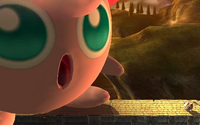
The Regenerating terrain glitch is a glitch in Super Smash Bros. Brawl that causes certain Final Smashes to stay in their activated state, if the character begins their Final Smash inside a piece of terrain that regenerates and interrupts the activation.
Eyeball glitch[edit]
In SSB4, a glitch can occur affecting the eyeballs of multiple characters, most notably Jigglypuff, as a result of an oversight in the coding of the graphical effects of characters eyeballs during Final Smashes. When breaking the Smash Ball with a move that causes a character's eyeballs to point in a certain direction, upon finishing their Final Smash, said fighter's eyeballs will be locked in this same position until a move or action is performed that also causes the fighter to look in a direction. This occurs because a fighter's eyeballs are temporarily replaced with yellow eyeballs when they break a Smash Ball, at which point their regular eyeballs are stored exactly as they were just before their eyeball model was replaced. In some extreme cases, this glitch can even be carried over into victory animations, such as one of Jigglypuff's victory animations.
Undead glitch[edit]
There was a glitch that existed in Brawl and SSB4 that allowed Giga Bowser, Wario-Man, Giga Mac, Mega Charizard X, or Mega Lucario to survive after being defeated in Stamina Mode. When this occurs, if the transformed character's HP is depleted, their stamina gets reduced to 0 HP (zero hit points) and their transformations are undone. Then they are able to continue to fight; despite having "0 HP" displayed.
Super Smash Bros. for Wii U digital manual description[edit]
"Break a Smash Ball and then press ![]() to unleash your character's unique Final Smash."
to unleash your character's unique Final Smash."
Names in other languages[edit]
| Language | Name |
|---|---|
| 最後の切りふだ, Last Trump Card | |
| Final Smash | |
| Smash final | |
| Ultra-Smash | |
| Smash Final | |
| Smash finale | |
| 最终绝招 | |
| 最後的絕招 | |
| 마지막 비장의 무기, Final Ace in the Hole[3] | |
| Ultieme smash | |
| Финальный смеш |
Gallery[edit]
Trivia[edit]
- Many Final Smash trophies credit their origin solely to Brawl in that game, or no credit at all is given in for Wii U, despite many Final Smashes (e.g. Light Arrow, Giga Mac, Wario-Man, Landmaster) being based on abilities from a character's respective series.
- In fact, the only one not to do so is Super Sonic, which lists Sonic the Hedgehog 2, the game in which the transformation debuted in the Sonic the Hedgehog series, as its other game in Brawl, though it gives no game of origin in for Wii U like the other Final Smash trophies in that game.
- There are five Final Smashes that can affect a team player when Team Attack is turned off: End of Day, Landmaster, Puff Up, Iceberg, and Galaxia Darkness (in Brawl only).
- When using a non-cutscene Final Smash that traps the target in place, if that target is KO'd (such as by a stage hazard or another player during a stamina match) or despawns (such as Nana disappearing after Popo is KO'd) during the Final Smash, the attacker will complete the full attack while attacking nothing.
- In Smash 4, when a character uses their Final Smash, their equipment is temporarily disabled. This is noticeable with Auto Heal and a high attack stat.
- If Rosalina is KO'd before her Final Smash wears off, her equipment will start working again.
- While Bowser, Little Mac, and Wario use mirrored versions of their regular special moves as opposed to any custom versions after transforming via their Final Smash, Lucario is still able to use its custom special moves, further enhanced by the boosted Aura.
- Ryu and Ken are the only fighters with two distinct Final Smashes in a single installment. Cloud also received a new Final Smash for his Advent Children costumes in version 10.1.0 in Ultimate, but it is mostly an aesthetic change to his default one.
- The input Hadoken, Shakunetsu Hadoken, and Oosoto Mawashi Geri can still be performed while in Final Smash standby mode. Firaga can also be repeatedly used while in Final Smash standby mode if it was the move used to break the Smash Ball, and Monado Arts can also be used in Final Smash standby mode, albeit only through the Art Dial by holding the special button while ending another special move. This makes Ryu, Ken, Shulk, and Sora (and Kirby with their Copy Abilities) the only fighters who can use a neutral special move in standby after breaking the Smash Ball, barring glitches and load delay.
- Mega Charizard X and Mega Lucario are the only Final Smashes that grant super armor as well as a reduction in damage sustained while transformed.
- When any Final Smash is used, if the user is completely off-screen (when the user is taking magnifying glass damage), there will be no start-up lag or animation; the attack starts up immediately. Cool down time is still normal.
- Mario, Captain Falcon, and Jigglypuff are the only three characters in the Original 12 to have kept their Final Smashes the same from Brawl in both Smash 4 and Ultimate without any functionality changes.
- This therefore makes Mario the only character part of the original 8 to not have his Final Smash change in function.
- Pit, Zero Suit Samus, R.O.B., and King Dedede are the only characters to have a different Final Smash in every installment since their introduction, with a total of three each.
- Palutena and Chrom are the only characters that originally appeared as part of a fighter's Final Smash in older installments, being Pit's Palutena's Army and Robin's Pair Up, respectively, before becoming a fighter themselves in a later one. In Palutena's case, Pit's Final Smash was changed and did not include her, whereas, in Chrom's case, Robin's Final Smash was not changed and still includes Chrom. This means that original-colored Chrom can attack himself through Robin's Final Smash. Both coincidentally became playable in the game following their Final Smash cameo.
- Chrom, Dark Pit, and Ken are the only Echo Fighters to have a different Final Smash from their base fighter.
- Charizard and Lucario are the only characters to receive a new Final Smash in a future iteration of a game, only to revert back to the original Final Smash in the next. In Charizard's case, it received Mega Charizard X in Smash 4, only to revert back to Triple Finish in Ultimate (as a consequence of being grouped back into the Pokémon Trainer's party). Lucario had Mega Lucario in Smash 4, only to revert back to Aura Storm in Ultimate (also in Ultimate, it is due to the design changes of how Final Smashes work in said game). However, unlike Charizard, Lucario keeps elements of its Smash 4 Final Smash, as it still transforms into Mega Lucario for the duration of Aura Storm.
- Joker's Final Smash, All-Out Attack, is the only Final Smash that can cut directly to the results screen.
- In Ultimate, seven Final Smashes remove the damage percentage, either due to the presence of text boxes or pre-rendered cutscenes, these being All-Out Attack, Triple Finish, Team Star Fox, Team Star Wolf, Gigaslash, House of Boom, and Supernova.
- Of these, All-Out Attack, Gigaslash, House of Boom, and Supernova are the only Final Smashes to remove it for the entire duration of the move, all belonging to DLC fighters.
- In Ultimate, when a character uses their Final Smash and other characters are in the frame during the initial shot, the other characters will have a shocked expression on their face.
- In Spirit Battles, after a puppet fighter with a permanent gold condition uses a Final Smash, they will return to normal before having the golden effect reapplied to them, playing the power-up sound and creating glowing particles just like when a fighter turns to gold when they collect 100 coins in Golden Plains or summon Xerneas from a Poké Ball.
- Stampede! (in Ultimate) is the only Final Smash whose inspiration was from an opening movie, that being Melee.
- In Ultimate, there are noticeably many characters whose Final Smash (or new Final Smash, in the case of veterans) wasn't officially announced until the game's initial release. This includes, Young Link, Meta Knight, Diddy Kong, Lucario, R.O.B., Robin, Daisy, and Richter. While Rosalina & Luma's Final Smash was shown in their gameplay showcase video, it used the Power Star like in Smash 4, instead of the Grand Star from the final build.
- In Ultimate, a handful of Final Smashes use pre-rendered cinematics for certain elements—specifically, All-Out Attack, Gigaslash, House of Boom, and Supernova. These attacks all share several aspects in common:
- They are all cutscene Final Smashes that are triggered by an attack making contact with an opponent.
- They all run at 30 frames per second, whereas the rest of the game runs at 60 frames per second.
- They all belong to DLC fighters from third-party franchises (Joker, Hero, Steve, and Sephiroth).
- The damage percentages and profile portraits themselves are completely removed during these cinematics.
- If the HOME Menu is opened during the cinematics, the cinematic will still continue to play out until the end in the background despite the fact that the game is otherwise suspended.
- Wario, Joker, Steve, and Sora are the only characters with a cinematic Final Smash who break the fourth wall by facing the screen during the cinematic in Ultimate.
External links[edit]
References[edit]
| Attacks in the Super Smash Bros. series | |
|---|---|
| Standard ground attacks | Neutral attack · Dash attack |
| Tilt attacks | Forward tilt · Up tilt · Down tilt · Crouching attack |
| Smash attacks | Forward smash · Up smash · Down smash |
| Aerial attacks | Neutral aerial · Forward aerial · Back aerial · Up aerial · Down aerial · Grab aerial · Glide attack |
| Throws | Grab · Pummel · Forward throw · Back throw · Up throw · Down throw |
| Get-up attacks | Floor attack · Edge attack |
| Special moves | Neutral special move · Side special move · Up special move · Down special move · Command-input move · Final Smash |
